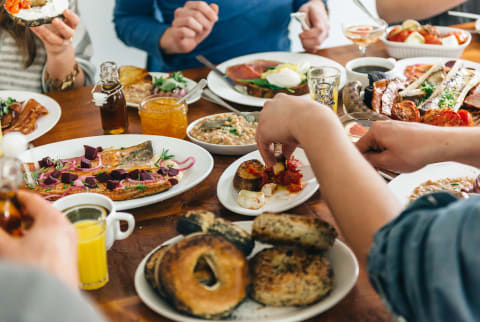
Image by Jen Grantham / Stocksy
October 20, 2023
Aging is something to celebrate. The wisdom, life experience, and compassion accumulated through the years are all wonderful. But the slowing down and losing strength? Not so much. Thankfully, according to precision medicine doctor Florence Comite, M.D., these common side effects of getting older can be avoided.
“Aging is inevitable. But getting sick is not to me. With the right tools, you can actually stop biological aging and reverse it,” Comite tells mindbodygreen.
After decades of working with patients, Comite has seen how essential food choices are to the aging equation. In fact, she considers diet the second most important predictor (behind only sleep) of metabolic health and longevity. Ready to eat your way younger? Here are her top five tips:
1.
Always build your plate around protein
Comite always recommends giving protein a starring role in your meals since the macronutrient is so effective at slowing the absorption of sugar and regulating appetite.
Managing blood sugar is essential for longevity, as research shows that high serum glucose levels are associated with higher perceived age (a.k.a it makes you look older) as well as higher biological age (a measure of how your body is functioning on a cellular level).
While there is no universally agreed-upon amount of protein to eat daily, most experts now recommend consuming 1.2 to 2.0 grams of protein per kilogram of body weight daily. This means most active people will want to eat at least 100 grams a day, or 30 grams at each meal.
“Especially if you’re vegan or vegetarian, you want to make sure that you get plenty of protein—and that’s hard to do,” says Comite. Check out our guide to getting enough protein on a plant-based diet here.
Don’t forget to pair your protein with fiber to further tamper the glucose effect.
2.
Limit refined carbohydrates
Not all carbs are “bad,” but refined carbs and starchy foods like processed breads, cookies, pastas, and sugary drinks tend to have a high glycemic index and can spike blood sugar.
Comite does note that the extent to which these raise sugar levels will vary widely from individual to individual. She personally wears a continuous glucose monitor (CGM) to see how her levels sway after she eats, say, a banana compared to a cookie.
For the most part, though, research shows there is a strong connection between eating more added sugars, starchy foods, and starchy vegetables and greater weight gain and poor metabolic health no matter who you are.
How to read labels
Wondering if a food will spike your blood sugar? Comite recommends reading the nutrition panel. “If the protein outweighs the combination of carbs and sugar, you’re doing fine.”
3.
Eat a balanced snack at night
Comite considers sleep the most important part of healthy aging—and your nighttime food choices have a big effect on it.
She recommends eating a satiating dinner (again, high in protein) that doesn’t leave you feeling peckish before bed. Ideally, you’re not eating within 2-3 hours of sleep. That said, you don’t want to go to bed hungry either, as this can cause blood sugar to dip during the night and disrupt your precious snooze. Sub-par sleep can also harm your body’s ability to break down carbs and regulate appetite, kickstarting a cycle that’s hard to break.
If you are hungry before bed, she recommends snacking on nuts (walnuts are her favorite because of their healthy omega-3s) with a small piece of fruit, as this shouldn’t sike your blood sugar.
4.
Don’t be afraid of healthy fats
While many people avoid fats because they are higher in calories, Comite notes that healthy fats like olive oil and avocado absolutely have a place in a longevity-supporting diet.
“You can’t even absorb certain nutrients that are in a salad, for example, if you don’t have a little bit of olive oil or some healthy fat there,” she says, noting that vitamins like E, A, and D are fat-soluble. Missing out on these nutrients can speed up aging, she says, so she always recommends getting at least some healthy fat with each meal.
RELATED READ: 10 Healthy Fats & How To Eat Them, From Nutrition Experts
5.
Don’t fall for fad diets
Finally, Comite notes that following a fad diet can actually accelerate the aging process. “You don’t know something will fit you just because it worked for a celebrity,” she says.
Whether it’s raw food, South Beach, or an intense fast, there is no way of knowing if a certain eating plan will work with your genetic makeup. Highly restrictive diets can also stress you out and raise your cortisol levels, which will not help in the healthy aging department.
She says you’re better off prioritizing the fundamentals covered above before trying anything more extreme.
The takeaway
Longevity diets don’t require hard-to-procure superfoods or expensive juice cleanses. In fact, they center whole, nutritious foods that fuel your body in all the right ways. Prioritize protein, fiber, and healthy fats while limiting late-night snacking, processed carbs, and restrictive diets, and you’ll help set yourself up for more years in your life—and life in your years.

